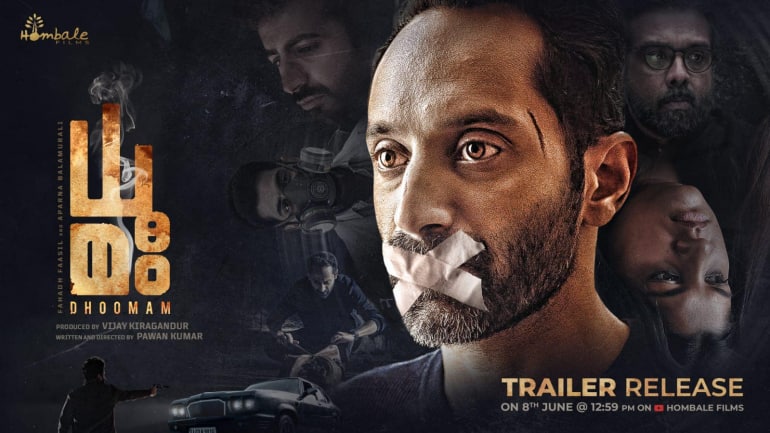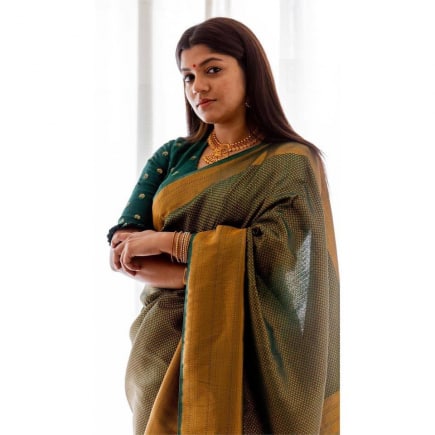



There is something very dependable about Aparna Balamurali’s celluloid image. Terms like efficient, ambitious, and no-nonsense instantly conjure up as you watch her in motion. Perhaps, it all started in Dileesh Pothan’s fabulous directorial debut Maheshinte Prathikaram (2016), in which Balamurali’s pro-active, lively girl-next-door called Jimsi had everyone sit up and take notice.
But having said that if one takes her career (24 films) in the last 10 years, this ‘reliable’ factor is omnipresent in all her characters. Be it the medical student turned salesgirl in Sunday Holiday (2017), the fiery Bommi in Soorarai Pottru (2020), or the librarian in Sundari Gardens (2022), they were characters that had a definite arc and didn’t require a man to anchor them.
This year, though, she was part of films that were commercially and critically appreciated, Balamurali’s characters were mostly extended cameos. But there is the much-awaited Dhoomam, directed by Kannada filmmaker Pawan Kumar and co-starring Fahadh Faasil, hitting screens on June 23. Then there is Kunchacko Boban-starrer Padmini and Raj B Shetty-starrer Rudhiram. In an interview the Thrissur-based, 27-year-old actor talks about reuniting with Faasil on Dhoomam, what kind of roles excite her and how Soorarai Pottru was different. Edited excerpts:

You are reuniting with Fahadh Faasil after Maheshinte Prathikaram. Both of you have evolved as actors. How was it on the sets?
In Mahesh..., I was an absolute fangirl. Now the equation is different. We have good conversations and cinema to discuss. But the best part has to be Fahadh narrating the backstories of iconic movie sets. I am still a fangirl though.
Dhoomam marks the debut of Kannada director Pawan Kumar in Malayalam cinema. What excited you about the film?
It’s about a Malayalee couple settled in Bengaluru. The core of the film is about karma hitting back at you. It talks about the emotional, physical, and business aspects of Nicotine consumption. He was very keen on exploring the politics of smoking. The whole mood of the film was very exciting. At any point in the film, if we were sceptical about where it was going, Pawan sir would put things in perspective.
Have things changed for you since the National Awards for Soorarai Pottru? Is there a change in the kind of roles that come to you now?
Not really. I was always getting good roles. Yeah, maybe, you can say that there is a responsibility that comes with such an award.
Soorarai Pottru is easily one of the best-written female characters in Tamil cinema in recent times. What was unfamiliar about Bommi and what you could relate to?
I was never as independent as Bommi. I was a protected single child. So her idea of starting a business and being financially independent was rather inspiring. She followed her dream and that was remarkable. Her determination was something I could relate to though.
Which is your favourite scene?
I think most of the scenes are there in my head. Also because of the kind of homework we did for the film. I don’t think I remember all the scenes of any other film so clearly. I like the scene in which Maaran (Suriya) is reluctant to ask me for money as well as the fight on the terrace with him.
When you get a role, does it always have to be out of your comfort zone to get you excited?
Yeah. If there is a scope for performance, I am excited as well as terrified. Am more tense before the shoot every time. It also depends on the character. For instance, when I did Soorarai Pottru, Sudha ma’am (director Sudha Kongara Prasad) wanted me to be in the character before the film started. Other directors would prefer improvisations on the sets. So, it all boils down to understanding the script and the character.
What’s the kind of space you would want, to bring out the best in you as an actor?
Having a congenial collaborative space always helps. A space without hierarchy! Maybe because I started in a Maheshinte Prathikaram that had a team that always worked as a collective unit. The difference is evident. We are working towards a single goal. So, it is important to keep your ego aside and work in unison. It is not about working with an experienced crew or a new crew, it is about your perspective and how you envisage cinema. Recently, I worked with a new set and there was no teamwork but then I worked with Shaji Kailas, and he was so hands-on on the sets. Having an exciting team leader can be infectious. Everyone wins when there is teamwork.
 Aparna Balamurali." width="435" height="435" /> South actor Aparna Balamurali.
Aparna Balamurali." width="435" height="435" /> South actor Aparna Balamurali.
Do you see more women than before on the sets now?
Yes, it is a lot better. So many women are coming now. I have said this before and I am saying it again, just because I haven’t had a bad experience, it doesn’t mean exploitation doesn’t exist in the industry. Fortunately, I started with such a great team that I have, perhaps, had it easy. I am grateful for that start, and I work keeping that in mind. Not everyone can be that lucky.
Why would you say no to a character now?
If I get something repetitive or if my character is just an ornament, then it will be difficult to pull it off. 2018 and Thangam have small characters but I chose them for different reasons. 2018 was an important film and I wanted to be a part of it. Thangam is the same team as Maheshinte Prathikaram. They are the reason why I am here.
Not because of its problematic politics?
Most of my films didn’t have that. In Ini Utharam (2022), there was a small dialogue which, I told them, might not be appropriate and I won’t say it. They were graceful enough to change it.
Do you, at times, wish that you were approached for lighter characters? Somehow all your characters have this commonality of being reliable and no-nonsense.
Yes. See that’s what I liked about Soorarai Pottru. All the characters had a balance. I think there is a problem when you say it is a female-oriented theme. I always wanted such tags to be eliminated. I want to work with good actors but that can often come in the way when you work on such labelled films. We don’t say male-oriented narrative, isn’t it? Ultimately it is only cinema. In Soorarai..., Bommi is given the same weightage as Maaran. I want to do such films.
Suma in Sundari Gardens was such a joy to watch. Were there some inputs from you?
Director Charlie first told me the story and later I read the full script. That helped. Originally in the script, Suma was someone who used to cry a lot and I said that wasn’t necessary. So, we had many such discussions and that’s why it was easier for me to get into the character. I loved that she had so many variations in her character. I think understanding the character and her motive is important. Then you probably start empathising with her, be it good or bad. Without doing that you can’t absorb that character. I think many of my characters have a little bit of me in them.
What is your idea of a well-written female character?
I think it is not about being bold. There should be a character arc, a beginning, and an end.
Is it a good time for female actors to be in Malayalam cinema now?
I would say it is not a bad space to be in anyway. I want to do more though. I think actors reach a saturation point. What’s next is always a burning question. I do get stuck that way. I think workshops help a lot. But, maybe, watch a lot of films too.
How do you dodge the repetition trap as an actor?
Rebooting will help. Or a trip can help. I think when we do back-to-back films, there is a problem. So, it is important to take a break, or everything will look the same.
What’s the most valuable lesson you have learnt from this industry?
One thing I have learnt is that it is easy to find success in one movie, but the toughest part is to maintain it for years. Then you have to battle insecurities on a daily basis, and mentally prepare yourself for the uncertainties of your job. When it comes to actors, I don’t think you can predict success or failure. A flop or hit can create a huge change in your life. There are so many challenges in the community of artists. It is very hard to face all of it.
But don’t you develop immunity over time?
Yes. But I haven’t reached that immunity completely. I am learning to balance things now. It is always a rollercoaster ride.
Not to forget the added burden of shouldering other responsibilities beyond acting in this age of social media, isn’t it?
Yes, there are too many things going on. You have to be a brand. You have to be accessible on social media as it is the main platform. Now everything is right in front of you — you can choose to address it or duck it. Unhealthy criticism isn’t easy to ignore as well.
Finally, is there a film of yours that you keep watching?
Honestly, I am embarrassed to rewatch my own films. But, yes, Soorarai Pottru, Maheshinte Prathikaram and Sundari Gardens are the ones I do love to rewatch. Actually, I was never a movie buff but now I have started watching films very seriously.
Discover the latest Business News, Sensex, and Nifty updates. Obtain Personal Finance insights, tax queries, and expert opinions on Moneycontrol or download the Moneycontrol App to stay updated!
Find the best of Al News in one place, specially curated for you every weekend.
Stay on top of the latest tech trends and biggest startup news.